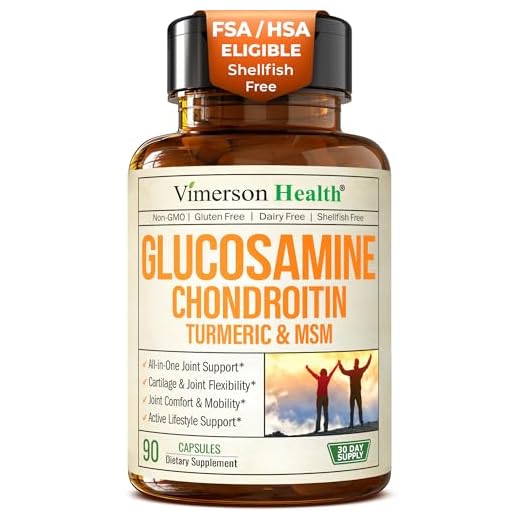







Vitamin C supports your joint health primarily through collagen synthesis, which is crucial for cartilage integrity. It acts as an antioxidant, neutralizing free radicals that can cause cartilage degradation. Research shows higher vitamin C intake correlates with an 11% reduced risk of osteoarthritis and lower inflammatory markers linked to arthritis severity. The recommended daily allowance is 90 mg for men and 75 mg for women, with sources like citrus fruits and red peppers. Understanding its precise impacts and ideal dosages can further enhance your joint health strategies. There's much more to explore about this essential nutrient's role.
Key Takeaways
- Vitamin C is essential for collagen synthesis, which maintains cartilage integrity and overall joint health.
- Higher vitamin C intake is linked to an 11% reduced risk of developing osteoarthritis.
- Its antioxidant properties help neutralize free radicals, reducing oxidative stress on joints.
- Adequate vitamin C levels are associated with lower inflammatory markers, decreasing arthritis severity.
- Research suggests that vitamin C supplementation may protect against cartilage degradation in animal models.
Importance of Vitamin C
Vitamin C plays an essential role in joint health, particularly due to its importance in collagen synthesis. Collagen is essential for maintaining the structural integrity of cartilage, which directly impacts your joints' functionality. Additionally, excessive Vitamin C intake can lead to gastrointestinal disturbances, highlighting the need to balance vitamin levels for overall health effects on digestion. Research shows that a higher dietary intake of vitamin C correlates with an 11% reduced risk of developing osteoarthritis. This indicates that ensuring adequate vitamin C levels can be a proactive measure for joint health.
Moreover, vitamin C's antioxidant properties help neutralize free radicals, reducing oxidative stress in joint tissues. This action is important, as oxidative stress often contributes to inflammation. Adequate vitamin C levels are associated with lower levels of inflammatory markers like interleukin 1-beta, which can greatly mitigate arthritis severity.
The recommended daily allowance (RDA) for vitamin C is 90 mg for men and 75 mg for women, emphasizing the necessity of a balanced diet. Dietary sources such as citrus fruits, red peppers, and broccoli can help you meet these requirements. By prioritizing vitamin C in your diet, you can support collagen synthesis and enhance your overall joint health while reducing inflammation and the risk of osteoarthritis.
Mechanisms Supporting Joint Health
Antioxidants play a fundamental role in maintaining joint health, and vitamin C is one of the most powerful among them. By neutralizing free radicals, vitamin C reduces oxidative stress in joint tissues, which helps prevent cartilage degradation that often accompanies conditions like osteoarthritis. Its involvement in collagen synthesis is essential, as collagen maintains the structural integrity of cartilage, thereby supporting overall joint function. Additionally, NOW Supplements Vitamin C Crystals provide a versatile powder form that allows for customizable dosages, making it easier to incorporate into your daily routine.
Research indicates that adequate vitamin C intake correlates with lower levels of inflammatory markers, such as interleukin 1-beta (IL-1beta), linked to arthritis severity and disease progression. This connection highlights vitamin C's potential in mitigating inflammation associated with joint disorders. Furthermore, vitamin C enhances the differentiation of mesenchymal stem cells into chondrocytes and osteoblasts, promoting cartilage formation and repair within joint tissues.
Animal studies have shown that vitamin C supplementation can markedly reduce cartilage destruction and levels of inflammatory cytokines, indicating its protective effects against joint damage. These mechanisms demonstrate how vitamin C supports joint health, making it an essential nutrient for maintaining optimal joint function and potentially alleviating the severity of arthritis.
Research on Vitamin C Efficacy
Numerous studies underscore the efficacy of vitamin C in supporting joint health, particularly in relation to conditions like osteoarthritis. Research indicates that a high dietary intake of vitamin C is associated with an 11% lower likelihood of developing osteoarthritis, based on a longitudinal study involving 1,023 patients aged 40 and older. Additionally, vitamin C supplementation has shown significant reductions in inflammatory cytokines, which could alleviate oxidative damage in articular cartilage, enhancing joint health. The antioxidant properties of Vitamin C are believed to play a vital role in protecting joint tissues and promoting ideal immune function, thereby supporting overall joint health antioxidant benefits.
Animal studies further support this, revealing that vitamin C may reduce joint destruction and pain, with ideal dosages around 100 mg/kg, emphasizing its chondroprotective effects. Cross-sectional studies demonstrate that individuals with higher vitamin C intake experience less cartilage damage in osteoarthritic knees, underscoring its protective role.
While these findings are promising, ongoing research is essential to clarify vitamin C's precise mechanisms of action and to determine ideal dosing for effective supplementation in joint health management. Understanding how vitamin C influences joint health will enable you to make informed decisions about dietary intake and supplementation strategies that can potentially mitigate the impacts of osteoarthritis and improve overall joint function.
Sources of Vitamin C
A variety of fruits and vegetables serve as excellent sources of vitamin C, essential for maintaining joint health and overall well-being. Citrus fruits, like oranges and grapefruits, are particularly notable, with one medium orange providing over 100% of the recommended daily allowance (RDA) for vitamin C. The RDA is 90 mg for men and 75 mg for women. Red bell peppers stand out even more, offering approximately 190 mg per cup, which greatly exceeds adult RDA requirements.
Other excellent sources of vitamin C include strawberries, kiwi, Brussels sprouts, cantaloupe, and tomatoes. Incorporating these fruits and vegetables into your diet can help guarantee adequate vitamin C intake, supporting not only your joints but also your immune system.
It's important to reflect on cooking methods, as they can impact vitamin C content. Since vitamin C is water-soluble and sensitive to heat, steaming or microwaving vegetables is preferable to boiling, which can lead to nutrient loss. If you find it challenging to meet your vitamin C needs through diet alone, dietary supplements are an option, but focus on whole foods for maximum health benefits.
Safety and Dosage Recommendations
When considering vitamin C for joint health, understanding safety and dosage recommendations is vital. The recommended daily allowance (RDA) for vitamin C is 90 mg for men and 75 mg for women. Maintaining adequate intake is essential for ideal joint health. While vitamin C is generally well-tolerated, excessive intake—typically over 2,000 mg daily—can lead to gastrointestinal disturbances. Hence, it's advisable to prioritize dietary sources over high-dose supplementation.
There are no established dosage recommendations specifically for arthritis, highlighting the need for individualized assessment based on your specific health needs. Studies indicate varying dosages, reinforcing the importance of personalized guidance. Since the body excretes excess vitamin C through urine, toxicity is rare when consumed in appropriate amounts. However, if you have existing health conditions or are taking other medications, consultation with a healthcare provider before starting vitamin C supplementation is strongly recommended. This precaution helps guarantee safety and addresses any potential interactions or concerns. By following these guidelines, you can effectively incorporate vitamin C into your routine to support joint health while minimizing risks associated with improper intake.
Future Directions in Research
Exploring future directions in research on vitamin C and joint health is essential for understanding its full therapeutic potential. To validate the effects of vitamin C supplementation on joint health, particularly for osteoarthritis treatment, double-blind placebo-controlled trials are significant. These studies can provide empirical evidence to support clinical recommendations.
Investigating ideal dosages of vitamin C for joint health is another important research direction. Different populations may respond differently, so establishing effective treatment protocols tailored to specific demographics is necessary. Additionally, longitudinal studies examining the long-term impacts of vitamin C supplementation on joint health and inflammatory pathways related to arthritis will help confirm initial findings and assess sustainability.
Moreover, exploring the synergistic effects of vitamin C with other nutrients, like magnesium, could enhance therapeutic approaches for joint health. Understanding these interactions may lead to more effective combinations in supplementation strategies.
Conclusion
In the grand scheme of joint health, it's almost ironic how something as simple as vitamin C is often overlooked. Yet, this powerhouse nutrient plays an essential role in collagen formation and inflammation reduction, directly impacting your joint function. As you ponder your health choices, remember that neglecting this vital vitamin could leave your joints feeling like a rusty hinge. So, embrace vitamin C, and give your joints the support they deserve—after all, they're the ones holding you up!




